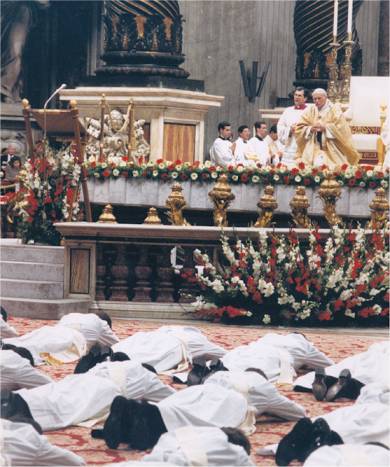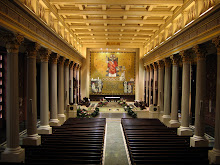In my first post regarding 'Exotic Cleveland', I mentioned that Fr. V. has re-introduced 'Sanctus Bells' during the Eucharistic Prayer, you know the little set of three or four bells that are rung by the servers during the Epiclesis (the calling down of the Spirit) and during the Elevation of the Sacred Species.
In the Comments of that post, the every present anonymous mentioned: "It must be hard to pray with those bells."
This being the interweb and all, it is hard to tell if this little comment was tongue in cheek, or a snide swipe at my fellow priest.
While he can explain it best, part of the discussion over the weekend centered around the use of these bells. His point, we do not celebrate anything important in this culture with silence. Go to the Red's Game (I know, pointless without Griff), if Dunner hits a homerun: loud noise, fireworks, cheering, rock music. Go to a Bengals game (again, why?), a touchdown brings celebration.
Certainly, those types of celebration are inappropriate during the greater Celebration of the Mass, where we welcome the Lord of the Universe truly into our midst. (yes, present in presider, community and Word, but now in a presence that is enduring: when everyone else leaves, HE's still there!) The ringing of the Bells gives the faithful an assistence in the assent to the recognition of Christ's true presence. Therefore, I see them as a value, and wish that we could use them at the Cathedral, but it hasn't happened yet. (They are waiting on my shelf, ready to be called on, though!)
So, my dear Anonymous, please feel free to come back and comment, sign your name if you wish, it is not that I expect you to agree, but it is that the ringing of three or four little bells help us to experience the Catholic Liturgy in all of it's finest, for Liturgy is not an act solely of the mind, but also of body. Hence, we use candles, incense, processions, vestments, and yes, even bells.
Friday, August 1, 2008
Subscribe to:
Post Comments (Atom)










8 comments:
Well said, Father.
My parish uses bells (usually), and it's odd NOT to hear them in that moment.
Honestly, if someone is disturbed at "prayer" at the sound of bells in that moment, I would suggest that the person in question is not in dialogue with God, but with themselves. The bells call our attention to what is happening on the altar, so, really, out of ourselves and into unity with our Lord.
I love the Sanctus Bells. Our parish has them every mass. I don't know why someone would find them disturbing, there is always SOME noise during mass, shuffling feet, dropped kneelers, baby fussing, emergency vehicle running by... if small sounds disturb one's pray I would humbly offer that maybe they need to relax just a hair.
To share something fun.
When my nine year old son was about 18 months old he went through a phase for a bout a month where he would hear the Sanctus bells and say "phone mommy, phone" quite loudly.
The first time I heard sanctus bells was on a mission trip in Costa Rica. Being a convert all of two years old at the time, I was not familiar with them. I thought they were for focusing one's attention on the Eucharist.
Given my reading about pre-Vatican II liturgy and that some would pass the time with other devotions, I just figured the bells were to get folks attention so they didn't miss seeing Jesus. Now I know there is a deeper symbolism, but part of me wonders if that practical effect might also lie at the origin of using sanctus bells.
Lastly, I didn't find them distracting. Notable, because I hadn't heard them before, but not detracting from reverence or prayer.
Not to be nit-picky about the "enduring presence" explanation, but now I'm curious. I take your point about the Real Presence being distinct from and superior to that in presider, community, and Word. But, if all of the hosts are consumed, then the Real Presence does not endure in that place, right? I'm not criticizing, I'm just trying to clarify my understanding.
Anon - Part of the beauty of the Holy Eucharist is that yes, it still resides... Christ resides in us! When we consume the Holy Eucharist, we truly believe we ARE consuming Jesus, Body and Soul, Humanity and Divinity and He then becomes part of us... our heart beat is no longer ours...it is also HIS. And, because He can not be separated from God - Jesus is the Second Person in the Most Holy Trinity and present in the Eucharist Sacramentally, God and the Holy Spirit are there as well. How awesome is that???
Our Church does not use the bells at all, nor does our Cathedral during weekday Mass, but it was so wonderful to hear the Sanctus Bells during Mass with Fr. V. and you this past weekend. I don't know about anyone else, but it helps keep me focused and my mind where it should be - on Jesus.
Anon 11:19
Perhaps it is best explained on Holy Saturday morning: the Church feels empty.
Now, I am alone in Church all the time (hazard of the job); but in Catholic Churches, it never feels empty. He's present.
On Holy Saturday, He's NOT there, and to me there is a palpable difference.
So to your question, yes, if all hosts are consumed, His presence does not endure; but that is not the normative case inside a Church building.
His point, we do not celebrate anything important in this culture with silence.
Also because the word “celebrate” usually is thought of to mean a party or some kind or happy gathering.
But the Mass is also the sacrifice of Calvary brought to the present; Christ becomes Transubstantially present and an actual and Real Sacrifice is taking place. And this is one of the core problems I see; a lot of people have lost the fact that the Mass is an actual Sacrifice in addition to Transubstantiation. I have even seen people quick to adhere to Transubstantiation but not to the Real Sacrifice at Mass.
Once the Mass is understood as Christ Crucified before us as the priest offers up a Real Sacrifice it becomes not a celebration like a party or sports event it becomes a solemn and sacred moment. Therefore Sacred Silence with only bells indicating consecration and elevation.
This also depends on which Mass you attend. For example the TLM the entire Eucharistic canon is said inaudibly (more silence) when the priest consecrates he immediately genuflects then he elevates, then genuflects again. At the first genuflection a bell is rung, at the elevation one to three are rung, and at the last genuflect one more bell. The Novus Ordo optional bell is of course immediately after the concentration during the elevation.
When the Roman Rite was reformed, the "sanctus bells" (sic) were relegated to optional status. Presumably this was to promote the understanding of the Eucharistic Prayer as a whole piece, beginning with the preface dialogue and concluding with the doxology and amen. Such a healthy understanding would prevent the faithful from seeing the institution as "the important part," while taking the rest of the prayer as so much window dressing. As we have seen, taking the words of institution out of their context could cause them to be trivialized, as this may promote an unhealthy magical piety that understands the mass merely as a machine which exists for the purpose of confecting the Holy Eucharist (and rendering the par excellence real presence of Christ). As a side note, indeed there are human events which are accompanied by silence, including loved ones standing or sitting side-by-side watching a beautiful sunset, or family members gathered in silence by the bedside of a beloved one who has just died. Indeed, some of life's most important moments are marked by silence, and often the liturgy itself calls us to silence, for example the extrememly powerful imposition of hands during ordination is to take place in SILENCE (technically without even instrumental music).
Post a Comment